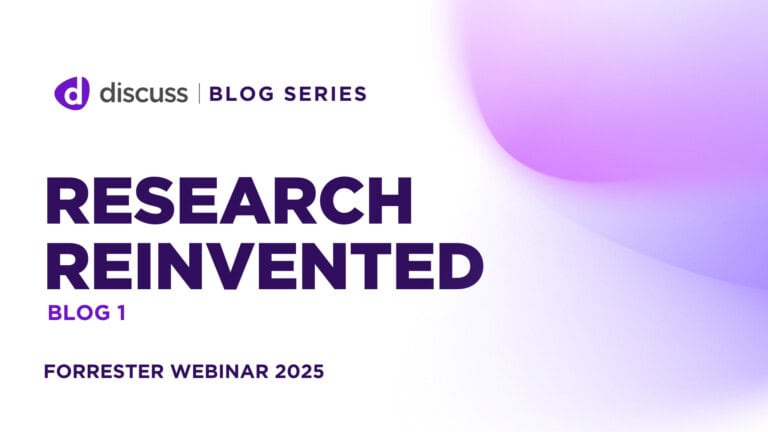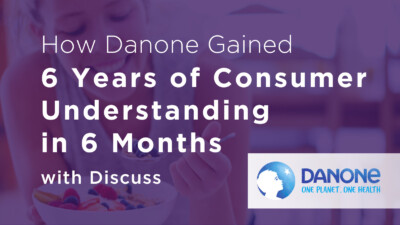Research Reinvented: Straight Talk about The Agentic Revolution with Forrester

This blog series grows out of Research Reinvented: How to Master GenAI and Ensure You’re Not Left Behind, a live conversation hosted by Discuss with Forrester analyst Rowan Curran, Quadrant Strategies’ Robin Lindberg, moderated by our own Senior Director of Product, Jilleun Eglin. In this first blog, we’re cutting through the hype to unpack what the agentic revolution really means for researchers, marketers, and product leaders, and how to use it without losing sight of human understanding.
A revolution hiding in plain sight
GenAI has dominated headlines for the past few years. But hype cycles are terrible teachers. Behind the buzzwords, something real is unfolding: the rise of agentic systems. If you work in insights, marketing, or product, ignoring this shift is risky. It may seem trendy and it’s certainly confusing. But it’s important to understand and pay attention to this now, because ultimately agentic systems will take action on behalf of the enterprise.
During our webinar, Rowan Curran, Principal Analyst at Forrester, summed it up:
“We went from ‘I need Google for my enterprise’ to ‘I need ChatGPT for my enterprise.’ And we continue to see this increase in… enterprise user demand in terms of overall insights and information delivery.”
That leap from insight to execution is what makes this a revolution. Beyond new dashboards or quicker summaries, we’re talking about systems that plan, orchestrate, and act on your behalf.
How we got here
Just a few years ago research teams were using highly customized, specific models to get insights. Then came enterprise-grade large language models (LLMs). Connected to company data through retrieval augmented generation (RAG), they became more powerful. Suddenly, you could ask plain-language questions and get tailored answers.
But summaries weren’t enough. Teams wanted AI to enable workflows to move forward. That hunger for systems that do things sparked the agentic revolution.
What makes a system agentic?
Rowan explained it simply: an agentic system takes an input (from a person or a process), runs it through a planner or orchestrator (a mix of models, rules, and guardrails), and then acts using the right tools. Think less “search bar with tricks” and more “colleague who rolls up their sleeves.”
Forrester plots this on two axes: agency (acting independently) and action (producing tangible outcomes). Standalone LLMs, predictive analytics, and robotic process automation sit lower on that spectrum. True agentic systems combine those capabilities with orchestration, letting them handle complex tasks with minimal hand-holding.
“Many of the systems marketed as agentic today are really just agent-ish. Valuable, yes. But not the same thing,” Rowan stated.
That nuance matters for anyone investing in research technology right now.
The uneven road ahead
Here’s the catch: not all agents will mature at the same pace. Forrester sees near-term gains in over the next 1-2 years with customer engagement agents for virtual agent self-service, employee support agents (HR, IT), and enterprise automation agents or what Forrester refers to as TuringBots. The more complex systems like consumer advocacy agents that act on behalf of individuals, or organizational stewardship agents that coordinate multiple sub-agents are three to five years away, not five months.
Rowan cautioned that while there’s plenty of excitement about fully autonomous, self-learning systems, enterprises shouldn’t expect to implement those today or tomorrow.
The smart move today is building AI literacy: know what’s real, what’s hype, and where early adoption makes sense.
4 lessons for research teams right now
- Start with pain points. Identify where time is wasted: setup, moderation, or analysis. That’s where agents shine first.
- Beware “agent-washing.” Vendors love buzzwords. Ask how a system actually plans, decides, and acts.
- Keep humans in the loop. Agents can summarize and suggest, but researchers add context, nuance, and the “so what.”
- Think hybrid. The magic happens when AI and humans complement each other. You need scale and speed on one side, empathy and storytelling on the other.
This hybrid mindset is what Discuss was built for. We don’t see AI as a replacement. We see it as a force multiplier that makes researchers, marketers, and product leaders more effective.
The Discuss perspective
We’ve lived this evolution with our customers. Early GenAI features focused on summaries and analysis. Today, our suite of AI Agents powers the entire research lifecycle:
- Project Agent shaves hours off setup by writing guides, structuring studies, and recruiting participants.
- Interview Agent moderates conversations globally, asking natural follow-ups that deepen insights.
- Insights Agent distills transcripts into themes, highlight reels, and quotable soundbites ready for stakeholder decks.
These agents don’t replace the expertise of your insights, marketing or product leaders. They give them time back to focus on alignment, storytelling, and decisions.
As Jilleun emphasized during the webinar, Discuss’ approach isn’t about letting AI run the show. It’s about giving insights, marketing, product, and UX teams the freedom to focus on the human questions – the ones only people can answer.
Your next step
If you want to see this shift in action, watch the full webinar recording with Forrester’s Rowan Curran and Quadrant Strategies’ Robin Lindberg. Their perspectives are invaluable for anyone navigating the agentic revolution.
And join us for the next post in this series, where we’ll unpack the two types of agents every research and insights leader should understand first.
Read the full series to learn how to scale qualitative research with AI while preserving human understanding.
Ready to unlock human-centric market insights?
Related Articles

The Four Lies We Tell Ourselves About AI Interviews (And What Actually Works)
Look, AI-moderated interviews are having a moment. Everyone’s talking about them. Some people are overselling them. Others are writing them…
Look, AI-moderated interviews are having a moment. Everyone’s talking about them. Some people are overselling them. Others are writing them…

Holiday Campaigns Meet Agentic AI: How Intelligent Agents Drive Last-Minute Creative Testing
Every marketer knows the feeling — it’s November, the holidays are around the corner, and your campaign calendar is bursting….
Every marketer knows the feeling — it’s November, the holidays are around the corner, and your campaign calendar is bursting….

Research Reinvented: Forrester on why researchers won’t be replaced by AI
This is the last article in our five-part series based on the webinar we hosted with Forrester and Quadrant Strategies,…
This is the last article in our five-part series based on the webinar we hosted with Forrester and Quadrant Strategies,…



